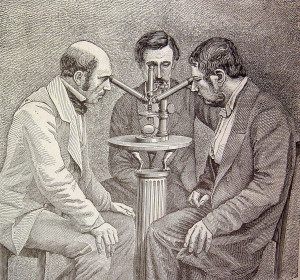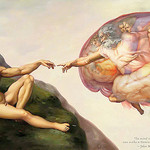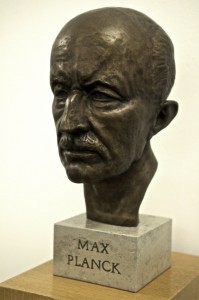Posted by Roberta Grimes • July 13, 2015 • 11 Comments
Afterlife Research, Jesus, The Source
The most important thing for us to understand about the spurious battle between  Christianity and science is that it is a battle that neither can win because neither of them is the open-minded pursuit of the truth. Both Christianity and modern mainstream science are belief-systems. And if you look at only what you want to see, always through a blur of pre-conceived notions, it is impossible for you to see anything clearly.
Christianity and science is that it is a battle that neither can win because neither of them is the open-minded pursuit of the truth. Both Christianity and modern mainstream science are belief-systems. And if you look at only what you want to see, always through a blur of pre-conceived notions, it is impossible for you to see anything clearly.
Neither Christianity nor science can serve us well until each of them loses its fear that its world-view might be wrong and begins an open-minded pursuit of the truth.
I was forcefully reminded of this problem when I read a review in the current Atlantic of a self-satisfied new book by evolutionary biologist Jerry Coyne called Faith Versus Fact. A review of the same book from a Christian perspective is here.
The book’s very title – Faith Versus Fact – sums up the primary problem with science. Christians understand that their religion is a belief-system, while scientists have made the belief that they are pursuing the entire truth a tenet of their particular religion. They don’t even realize they are practicing a religion! And when your vision is so altogether distorted that you cannot recognize that those distortions exist, then it is hard to see where you go from there.
Science prior to the twentieth century seems to have had a more open-minded investigative function. There was then less fear of finding God, and more of a hopeful sense that reality could be objectively investigated and better understood. But the start of the twentieth century brought the advent of quantum mechanics, and at the same time it saw the production of some phenomenal communications delivered through deep-trance mediums by teams of dead researchers who were trying to give us proof of their survival. Rather than having to deal with the dead while at the same time they were digesting quantum mechanics, university departments and peer-reviewed journals adopted materialism as science’s “fundamental dogma.” They made the study of afterlife evidence and anything related to spirituality off-limits for anyone who wanted to work in a university setting.
Mainstream science’s fundamental dogma of materialism remains in place. To this day, no scientist who wants a university career or hopes to be published in a peer-reviewed journal can work in any area of research where he might discover that reality is based in an underlying intelligence. By strictly limiting what scientists can and cannot legitimately study, the scientific gatekeepers of the past century have turned science into as much of a deluded belief-system as Christianity ever could be. Both are built upon faith, whether in God or in not-God. And Dr. Coyne is right about one thing. Faith is no substitute for facts.
Into the void left by science during the past hundred years have stepped earnest laypeople bent upon studying the afterlife evidence and the nature of reality without any beliefs-based limitations. These folks are currently the only people who are doing science as Sir Isaac Newton understood science. And over a century of effort they have learned a great many things that would be useful to both Christianity and science, if either had any interest in stepping outside its own beliefs-based boundaries. For example:
 system, and as you would expect, its tenants are first-century beliefs. Early in its history it decided that its whole Bible is “the inspired word of God,” but except for the Gospels, the God that inspired those writings has no objective reality.
system, and as you would expect, its tenants are first-century beliefs. Early in its history it decided that its whole Bible is “the inspired word of God,” but except for the Gospels, the God that inspired those writings has no objective reality. solar system of the atom together. We must assume behind this force the existence of a conscious and intelligent mind. This mind is the matrix of all matter.”
solar system of the atom together. We must assume behind this force the existence of a conscious and intelligent mind. This mind is the matrix of all matter.”As you can see, the greatest discoveries of the past century have been made in the yawning gap between the two belief-systems, science and Christianity. It is only in the open-minded study of everything that humankind can find a way forward that is based in what is actually real.
 So now we have Christians stuck in a much-beloved but altogether outmoded belief-system and worried that scientists might find that God does not exist, and scientists stuck in another much-beloved but altogether outmoded belief-system and worried that they might find that God DOES exist. Both of our most trusted institutions are caught up in a useless, spurious battle which Dr. Coyne attempts in his book to keep us focused on for just awhile longer. He and his fellows are trying to prevent our noticing that the scientific emperor has no clothes until they can finish out their careers. It is hard to be sympathetic with these scientists, the pleasures of tenure notwithstanding. As a result of its intransigent insistence on the notion that a century-old world view is still relevant, science is keeping humankind mired in ignorance.
So now we have Christians stuck in a much-beloved but altogether outmoded belief-system and worried that scientists might find that God does not exist, and scientists stuck in another much-beloved but altogether outmoded belief-system and worried that they might find that God DOES exist. Both of our most trusted institutions are caught up in a useless, spurious battle which Dr. Coyne attempts in his book to keep us focused on for just awhile longer. He and his fellows are trying to prevent our noticing that the scientific emperor has no clothes until they can finish out their careers. It is hard to be sympathetic with these scientists, the pleasures of tenure notwithstanding. As a result of its intransigent insistence on the notion that a century-old world view is still relevant, science is keeping humankind mired in ignorance.
The whole faith vs. fact dichotomy is altogether spurious. Dear friends, there is only one reality. There is not a “faith” reality and a “facts” reality, with the facts version obviously superior. In order to lay claim to knowing the “facts” and to be justified in calling itself superior to Christianity, science would have to study all the evidence on which facts might be based, including nearly two hundred years of abundant and consistent afterlife evidence. Dr. Coyne in his nineteenth-century artifact of a book condemns Christianity for “thinking that an adequate explanation can be based on what is personally appealing rather than on what stands the test of empirical study.” He would be well advised to look in a mirror.
Actually, and not for the first time, the only one who comes through all of this looking smart is Jesus. Unlike either science or Christianity, the thought of our seeking the whole truth does not scare Him. He is not afraid to urge us to “Ask, and it will be given to you; seek, and you will find; knock, and the door will be opened to you. For everyone who asks receives, and the one who seeks finds, and to the one who knocks the door is opened.” (MT 7:7-8) Even after two thousand years, He still is hoping that you will at last “know the truth, and the truth will set you free.” (JN 8:32)
smart is Jesus. Unlike either science or Christianity, the thought of our seeking the whole truth does not scare Him. He is not afraid to urge us to “Ask, and it will be given to you; seek, and you will find; knock, and the door will be opened to you. For everyone who asks receives, and the one who seeks finds, and to the one who knocks the door is opened.” (MT 7:7-8) Even after two thousand years, He still is hoping that you will at last “know the truth, and the truth will set you free.” (JN 8:32)
photo credit: <a href=”http://www.flickr.com/photos/dustpuppy72/4290962747/”>Dustpuppy72</a> via <a href=”http://photopin.com”>photopin</a> <a href=”http://creativecommons.org/licenses/by-nc-nd/2.0/”>cc</a>
photo credit: <a href=”https://www.flickr.com/photos/beginasyouare/1045120420/”>Mike_tn</a> via <a href=”http://photopin.com”>photopin</a> <a href=”http://creativecommons.org/licenses/by-nc-nd/2.0/”>cc</a>
photo credit: <a href=”http://www.flickr.com/photos/60532802@N07/5546682698″>Head of Jesus Christ 62</a> via <a href=”http://photopin.com”>photopin</a> <a href=”https://creativecommons.org/licenses/by/2.0/”>(license)</a>
Thanks for sharing your well constructed and well written understanding of one of the greatest issues facing humanity in the 21st century. We are moving into the era of both/and and leaving behind the time of either/or.
When science and religion realize that everything is an expression of consciousness they will lose their opposition and embrace the whole. That is the progression of human consciousness and it is happening now. You are helping to shed light on the middle way.
Conversations with God Book I by Neale Donald Walsch addresses this issue. I don’t have in front of me so I can’t quote it directly but the basis of it is that Walsch asks which is “right” creation or evolution. the reply he gets is something like: “Why does it have to be one and not the other? Both and would be a more appropriate answer to this question.
You’re right, Lorie! The whole creation vs. evolution argument is another spurious battle over nothing that is being employed to distract us from noticing that both our scientific and our Christian emperors have no clothes. A possible answer, based on nearly 200 years of abundant and consistent afterlife evidence, is that the only thing that exists is an infinitely powerful and infinitely loving energy-like potentiality of which each of us is a part – God, in other words – and that God continuously manifest the universe. It wasn’t “created” in the past, but rather since time is not objectively real it is apparently in a state of continuous manifestation. I don’t understand it, either!
Wonderfully expressed, dear Michael! Thank you for your thoughts. I agree with what you say, and I’m thrilled to join you in watching it actually happening around us: human consciousness is being elevated as we speak. I am coming now to dare to hope that in another generation or two all of humankind will be united in an open-minded and joyous pursuit of what is true.
Another fine blog, Roberta! Agree with and enjoyed reading it.
P.S. I’m wondering if the “Michael Newton” who left the first comment is the same Dr. Michael Newton, the esteemed afterlife researcher who wrote “Journey of Souls” and “Destiny of Souls”?
Hi Michael! Wow, I hadn’t thought of that. But isn’t it a fairly common name? Our Michael Newton has commented here before, and always wonderfully. The best thing for me about doing this work is all the thoughtful, brilliant friends we’re making – don’t you agree?
Yes, Roberta, you’re right about the people who respond here. They’re all good, intelligent folks.
“Michael Newton” is somewhat common, but not as common as mine! That’s why I use my middle initial. – Anyway, I guess we’ll never know, unless he reads this and decides to comment here on his identity one way or the other.
Thank you for commenting, Michael! It’s good to be sharing this journey with you!
Roberta
Proof of immortality of the soul was provided by Socrates on the last day of his life on earth as recorded by Plato in the “Great Dialogues of Plato” by W. H. D. Rouse. While this dialogue titled PHAEDO (Phaidon) The death of Socrates, 399 B.C. provides an excellent argument for immortality it also provides an uncanny description from space of the planet. Socrates also provided an excellent argument for the retention of memory by the soul.
That’s fascinating, John – thank you! I had heard of this episode, but you are more learned than I am I must admit. Do you suppose that perhaps Socrates had an Out of Body experience, and that is why we have a description of the planet seen from space?